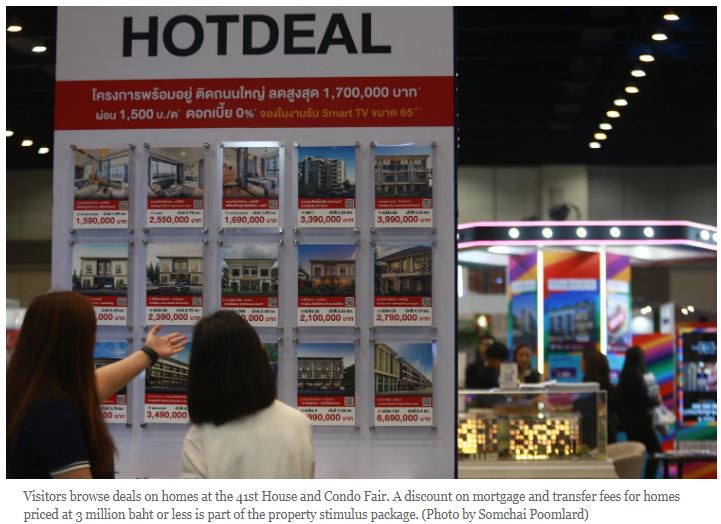Thailand: Finance Ministry, property firms launch promotion
Domestic property firms are preparing to launch a joint promotional campaign with the Finance Ministry to stimulate the property market before the year-end.
Charnkitt Dejvitak, the vice-minister attached to the prime minister, said properties priced at no more than 3 million baht and bought directly from real estate firms will have the transfer fee and mortgage fee reduced to 600 baht each from the standard fees of 90,000 baht.
The discount is part of measures designed to rev up the property market, where sales have been declining, Mr Charnkitt said.
“The government wants the real estate sector, which has a pass-through effect with other businesses, to play a part in driving the economy from the current slowdown,” he said.
The cabinet on Oct 22 approved the property stimulus package that includes a temporary cut of mortgage and transfer fees to a single rate of 0.01% for homes priced at 3 million baht or less.
The package is meant to help developers dispose of inventory and will come into effect after the interior ministerial announcement takes effect, running until Dec 24, 2020.
GH Bank also offers 2.5% loan interest capped at three years for properties priced at no more than 3 million baht. The bank has combined lending worth 50 billion baht for this scheme.
Mr Charnkitt’s remarks came after chairing a meeting with three property associations: the Thai Real Estate Organisation, the Thai Condominium Association and the Housing Business Association.
The three associations agreed to launch the discount campaign for properties with a ceiling price of 3 million baht. There are roughly 35,000 units that are completely built and ready for sale, Mr Charnkitt said.
An estimated 145,000 property units priced below 3 million baht will be built and ready for sale in 2020, he said.
In a separate development, the Fiscal Policy Office (FPO) and the Treasury Department said most of the regulations under the Land and Building Tax Act will aid property owners in paying the tax, due to exemptions, ease of use and lowest rates being applied.
Chumpol Suwannakijboriharn, a tax law specialist at the FPO, said many types of property will be exempted from the land and building tax.
They will include utilities, common areas and common properties in industrial estates and low-rise housing projects that have a land allotment permit. Common areas and common properties in condominiums will also be exempted.
Water treatment ponds and public ponds in residential and industrial estates will be exempted.
For low-rise housing projects and industrial estate projects that have units or land remaining unsold, common areas and unsold land will get a deduction of up to 90% for three years starting from the year the projects get a land allotment permit.
Properties damaged by natural disasters will have a tax deduction or exemption dependent on the local authority’s consideration, Mr Chumpol said on Wednesday at a seminar on the Land and Building Tax Act and its 19 laws.
The 19 laws comprise a total of 98 sections under the Land and Building Tax Act, which are issued by the Finance and Interior ministries.
“But property owners do not need to learn all of the laws, except for those related to their properties,” Mr Chumpol said.
The new tax law took effect on March 13, 2019, and tax collection will start on Jan 1, 2020.
“Property owners should survey the value of their property to figure out how much they pay for the tax,” Mr Chumpol said. “It may not be as high as they think compared with spending on doing something like agriculture on their property to reduce the tax.”
Atip Bijanonda, honorary president of the Housing Business Association, suggested that landowners pay the land and building tax once to learn the tax rate they need to pay before making a decision to do anything on land to reduce the tax burden.
Mr Chumpol said other properties that will be exempt will include unused land and properties owned by state agencies and private land for public use.
A main residential unit where land and building together are valued at no more than 50 million baht and where the only unit is valued at no more than 10 million baht if the owner owns only the unit will be exempt from the tax.
Wilawan Veerakul, the Treasury Department’s deputy director-general, said the appraisal prices for housing units that many people were concerned about will have only a single price for each category.
“We reduced the standard design of buildings from 59 to 36 types to help make the laws easy for people to follow,” she said. “For residential units, there will only be single house, townhouse, shophouse and row house.”
Each type will also have a single price, no matter what kind of materials were used in its construction.
Source: https://www.bangkokpost.com/business/1788884/finance-ministry-property-firms-launch-promotion


 Thailand
Thailand




